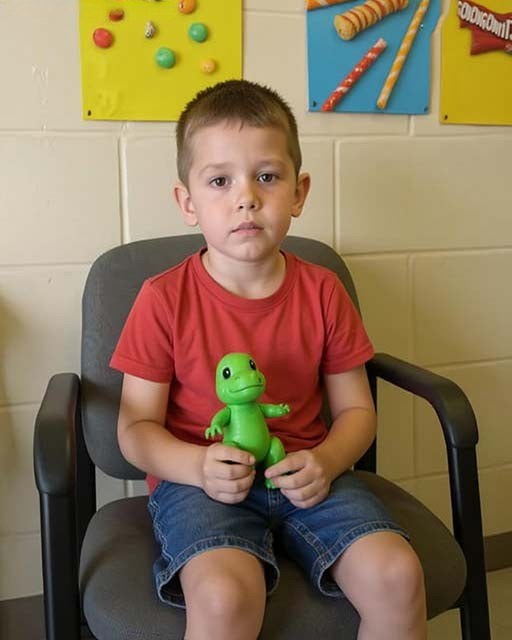I still remember the day Emma arrived.
I was five when Mom and Dad told me I was going to be a big sister. They promised a lifelong friend. What they didn’t mention was that I’d become invisible.
Before Emma, I was their world—surprise cupcakes after school, bedtime stories, warm snuggles. But the moment she stepped through the door, everything changed. Her cries drew instant attention. Her needs eclipsed mine. My scraped knees or school performances faded into the background.As the years passed, the gap widened. By the time Emma was walking and talking, I was pouring my own cereal and packing my own backpack. If I asked for help, I was “too needy.” Emma’s smallest sigh, meanwhile, sparked a flurry of care. Birthdays, recitals, injuries—my big moments were quietly overshadowed by her louder ones.
Fast-forward twenty years. I was thirty, raising my bright, curious three-year-old son, Theo, on my own. His father left before he was born. I stitched together our life with the help of friends and the occasional contribution from my parents. They weren’t cruel—just selectively generous. From the moment Emma had her son, Cody, they treated him like their third child—new clothes, music lessons, babysitting on demand. I was still around, just part of the scenery.Then, last month, everything changed.
I collapsed at work, clutching my side. A ruptured ovarian cyst sent me to the ER and into emergency surgery. Groggy and scared, my first thought was of Theo. Who would care for him?I called my parents.
“Mom, it’s urgent. I need someone to watch Theo while I recover,” I whispered.
Her sigh traveled miles. “Sweetheart, we’re on babysitting duty for Cody. Emma’s out of town.”
“Mom, I’m in the hospital. I can’t even lift my head.”
“I know,” she said softly. “But we can’t handle two boys right now. I’m sorry.”
I hung up, stunned. While my own mother said no, my friend Maya—juggling two kids and a full-time job—said yes. She came to the hospital with Theo in her arms and stayed until I was well enough to go home.
When I left the hospital, weak and stitched up, I went straight to Maya’s. Theo ran to me, clung to my leg, and whispered, “Mom, I missed you like the moon.” My tears fell—not from pain, but from gratitude. Someone truly saw us.
A week later, I visited my parents. Emma was there, talking about Cody’s daycare while he sat on the floor, glued to a tablet. Dad refilled her coffee like she was royalty.
They noticed me eventually.
“Oh, you’re out already!” Mom smiled. “Feeling better?”
“Tired,” I said. “But I’m okay.”
Emma barely looked up. “Kids are tough. Bet Theo was fine.”
“He was—thanks to Maya,” I said, watching their faces shift.
Mom’s smile faded. “We really wish we could’ve helped. But Cody needed us.”
“Cody always comes first,” I said, quietly. “I needed you, and you weren’t there.”
Emma rolled her eyes. “Don’t be dramatic.”I took a breath. “This isn’t about drama. It’s about being invisible. Again.”Dad cleared his throat. “We didn’t mean it like that.”
“But that’s exactly how it felt,” I said. “I’ve spent my whole life fading into the background—except for family photos.”Family vacation packages
Silence filled the room. I left with nothing more to say.
A few days later, a card arrived. A generic Hallmark message. A scribbled line: “We’re sorry—hope you feel better soon. Love, Mom and Dad.” No mention of Theo. No real apology. Just an attempt to patch a wound that ran deep.
That night, as I tucked Theo into bed, I made him a promise: he would never feel invisible. Never feel like a burden.
The next day, I stopped waiting for my parents to change. I built a new village instead—Maya and a circle of preschool moms. We shared child care, swapped advice, leaned on each other when things got hard.
One afternoon at the park, Theo tripped and scraped his knee. He burst into tears, more startled than hurt. I scooped him up, kissed his brow, and whispered, “I’m here, baby. You’re safe.”
He sniffled, looked up, and said, “You always come, Mama.”
That was everything.
I didn’t need my parents’ approval. I had Theo. I had people who showed up. We laughed, healed, and built a life where I was no longer invisible.
And one day, I’ll tell Theo the whole story—not to make him bitter, but so he understands: real love isn’t something you beg for. It’s something you give freely. Even after pain, you can build something better.
We did.
Together.
